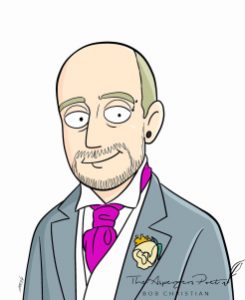Bob Christian, “Aspergers Poet,” is a father, husband, and poet on the autism spectrum. He blogs about his life, on The Ramblings of Bob Christian. He is also author of a collection of poetry called Behind the Mask. This week, he shared his experiences on receiving a late diagnosis and having two neurotypical daughters.
You mention on your website that you use poetry to “express those pesky things that you NT’s (Neurologically Typical) find so easy – yes, emotions.” When/how did you first discover that poetry was useful in this way?
It was back in 2005, when I had been wrongly diagnosed with Bipolar disorder and my psychiatrist had suggested that I keep an emotional diary. This became the basis for my earlier poems. I discovered that it was easier to write about how I feel and turn them into poetry.
Do you have any favorite poets? Why?
My favourite poets are spoken word artists like Neil Hilborn from Button Poetry in the USA, and a young English lad called Suli Breaks. Both of these guys bring a fresh, youthful attitude to the scene and they discuss things that the younger generations are interested in.
How did you feel upon receiving a diagnosis of Asperger’s?
I felt very emotional upon receiving my diagnosis at 40 years of age. It was emotional because it proved what I had thought all along – that the previous diagnoses of Bipolar and Schizophrenia were incorrect. Both of those diagnoses have been retracted now and my only diagnosis is Asperger’s. I also felt more free than I had in a very long time because it made sense of everything.
What unique challenges and/or benefits do you have as an autistic parent to neurotypical children?
I find the most challenging thing as a parent of two grown up NT daughters is that I’m not very good at talking to them about feelings and emotions. They don’t even try now, but luckily they do talk to my wife, their step-mum. The plus sides are that my children know where they stand with me as I see things as very black and white and say exactly how I feel.
What mistakes do neurotypical parents make as autism advocates?
I would say that the biggest mistake is thinking that because they know their autistic child, they know all autistic people. That’s not the case, because the spectrum is so wide, really every autistic person is different.
What is one thing you wish more people knew about autism?
The one thing I wish is that people would realise is that because I have Asperger’s or higher functioning autism I really struggle with some of the day-to-day things that NTs find straightforward and easy. Often, because I’m high functioning, people, even my family, forget that I am different and that I struggle in some situations.
Another thing is thinking that autistic people don’t feel emotion. That is completely incorrect, we do feel it, and often feel it more deeply than NTs. We just often process emotions differently to NTs.


Dave Green
Sarah Baines
theresa kovatch
Jenna